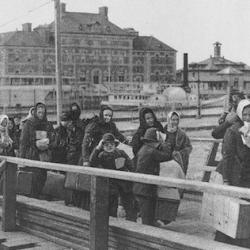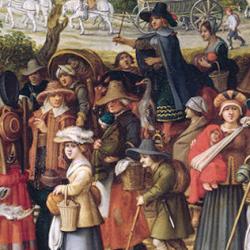There were Gentiles living in the land that were not part of Israel. They did not necessarily share the faith of Israel; they were not circumcised; they were not ethnically related to Israel. Yahweh insisted that they were not to be grudgingly tolerated, but were to be treated with respect and even love.
Being a sojourner or a stranger in a land is part of Israel’s heritage, Christians claim that our fathers were strangers in a land that was not their own. Long before Israel conquered Canaan, it was the “land of their sojournings” (Gen 17:8; 28:4; 36:7). When Israel went into Egypt, they situation was similar, sojourners and aliens in a foreign land.
This experience became the basis for exhortations in the law to pay special attention to sojourners and strangers in the midst of
In welcoming strangers, Israel was imitating Yahweh, who shows mercy and take special care for the sojourners and strangers. Deuteronomy 10:17ff reminded the Israelites that Yahweh does not accept bribes or pervert justice or show partiality. This righteousness that cannot be bought off, is particularly shown in the fact that he acts justly for those who have nothing to pay, no return gift to give, namely, the orphan, widow, and stranger. Yahweh defends helpless and provides food and clothing for alien. It is not that the alien or the helpless are always in the right; rather, God does not judge on the basis of their ability to pay him off. Verse 19 applies this to Israel: God provides food and clothing for aliens, aliens like Israel in Egypt, whom He brought out with great wealth. Therefore Israel, the recipient of God’s justice to the alien, is to show love for alien.
Strangers enter and reside in the land with Israel’s permission; they were not illegal aliens. Strangers were to obey God’s commandments, and the fact that there was one law for Israel and alien meant that a Gentile criminal would be punished for his crimes, just as an Israelite would be. At some points the law for the alien and the Israelite differed. Aliens did not have to be circumcised, and so did not come under the purity regulations of Torah. Aliens could eat unclean food, and Israelites could sell it to them. Aliens could not own land in perpetuity; it would revert to the original Israelite owners in the Jubilee. Gentiles were not expected to assimilate fully to Israel, and at some points they were accorded second-class status.
Ezekiel 22:7 is an oracle against the “blood city,” where the blood of innocent is shed and the blood of idolatrous sacrifices. Jerusalem is guilty of dishonor to parents, disrespect for authority; and failure to act kindly toward the weak: “The alien they have oppressed in your midst; the fatherless and the widow they have wronged in you.”
God warns in Malachi 3:5 that He will send His messenger to purify Israel and to refine her with fire, parly to purge those who oppress laborers, aliens, widows and ophans.: “I will be a swift witness against the sorcerers and against the adulterers and against those who swear falsely, and against those who oppress the wage earner in his wages, the widow and the orphan, and those who turn aside the alien, and do not fear me.”
Following Torah, Jesus makes it clear that the negative commands imply positive duties: Not oppressing the weak and vulnerable implies caring for, assisting, helping the sojourner. According to Mathew 25, Jesus will judge on the basis of our generosity toward those who are in need, the little brothers of Jesus. Jesus’ brothers are specifically His disciples, but the passage still explicitly mentions strangers (vv. 38, 43).
Indeed, Jesus’ entire mission is focused on aliens and strangers. By His death, Jesus brings “strangers and aliens” near (Ephesians 2:19ff). These are “spiritual” aliens, but their estrangement is social as well as spiritual. These are the Gentiles who formerly were far off, formerly second-class citizens. In the temple of the Spirit, they are made fellow-citizens with the holy ones. They are no longer attached to the household; they become members of the family.
In Jesus and in His church, God brought near sojourners and strangers, made them as members of his house, and offered His table to them. He tells us, Go and do likewise.















